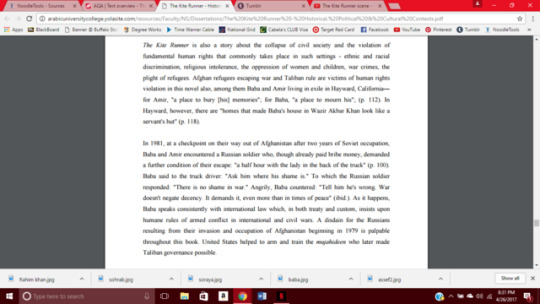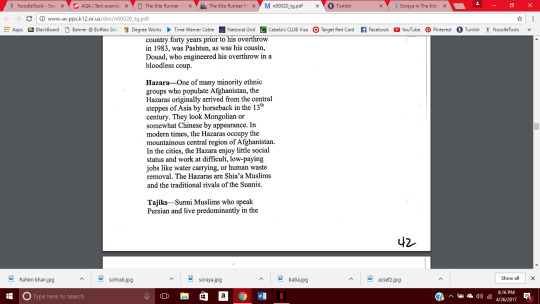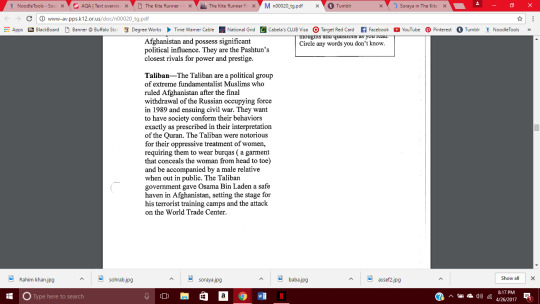Multimodal Project// Rachel Robinson// Young Adult Literature
Don't wanna be here? Send us removal request.
Quote
'Who did you eat today, you flat-nosed Babalu?'
P. 9
Ali is made fun of by the neighborhood kids for his paralysis
0 notes
Quote
'You! The Hazara! Look at me when I'm talking to you!' the soldier barked...[He poked his] middle finger of his other hand through the circle. 'I knew your mother did you know that?'
P. 7
0 notes
Quote
I stepped into Hassan and Ali's quarters only a handful of times... I remember it was spare, clean, dimly lit...
P.6
0 notes
Quote
On the south end of the garden, was then servant's home... a modest little mud hut...
P.6
0 notes
Quote
Why don't you go read one of those books of yours?
P.5
0 notes
Quote
Baba and his friends reclined on black leather chairs there after Ali had served dinner
P. 4
0 notes
Quote
Then in turn opened into an extension of the driveway into my fathers estate... Everyone agreed that my father, my Baba, had built the most beautiful house in the [district], a new and affluent neighborhood...
P. 4
0 notes
Text
The central event of the novel is the rape of Hassan, an atrocity that results from his loyalty to his Pashtun friend Amir (Assef calls Hassan a 'loyal dog'). This event which Amir witnesses and about which he does nothing haunts him for life. Assef's brutal actions on a domestic scale reflect the later, historically grounded, 'massacre of the Hazaras in Mazar-i-Sharif'. As a child, Amir knows he is complicit in the obscene bullying of Hassan, his friend, but at first refuses to acknowledge his guilt, instead compounding Hassan's misery by heaping on him further cruelty. As he moves into adulthood, carrying the burden of his sins, Amir realises he can only gain redemption by recognising his abuse of power, atoning for his wrongdoing and by rescuing and loving Hassan's son Sohrab as a person in his own right, distinct from his ethnicity. Amir's learning – and courage perhaps - is reflected in his angry outburst to General Taheri at the end of the novel: 'you will never again refer to him as Hazara boy in my presence. He has a name and it's Sohrab'.
SOURCE:
Text Overview-The Kite Runner." AQA Realizing Potential, www.aqa.org.uk/ resources/english/as-and-a-level/english-literature-b/teach/ protest-c-text-overview-kite-runner.
0 notes
Photo

The Pashtun’s were a group that took over more than half of the Taliban. Could the devastation in the novel be a portrayal that money and social status is not what makes a person human.? i.e., Hassan died out of honor, and had nothing/he went through traumatizing events and still remained kind and optimistic.
SOURCE:
Shamnad, N. "'The Kite Runner' by Khaled Hosseini : Historical, Political and Cultural Contexts." Arabicuniversitycollege.yolasite.com, 2010, arabicuniversitycollege.yolasite.com/resources/Faculty/NS/Dissertations/ The%20Kite%20Runner%20-%20Historical,%20Political%20&%20Cultural%20Contexts.pdf.
0 notes
Text
SOCIAL CLASS IN THE NOVEL
“ Their very relationship is defined by social status-Amir is Pashtun, which in turn makes him the wealthier, socially accepted Afghani. Hassan, on the other hand, is one of his family’s servants, a Hazara who, because of his ethnicity, is the social outcast.
Amir and his father have an unusually close relationship with their Hazara servants Ali and his son Hassan. So unusual in fact, that it is often commented on by the other townspeople: “Lucky Hazara, having such a concerned master” P.70
Amir is the kite flyer, while Hassan is the kite runner. Due to Hassan’s Hazara ethnicity, he cannot be more than a kite runner. The relationship between the kite flyer and the kite runner amplify the social and class differences between the two races.
During the kite fighting tournament, Amir faces another threat—Hassan is exceptional at kite running, better than he, Amir, could ever hope to be: “I wasn’t just slower than Hassan but clumsier too; I’d always envied his natural athleticism” (Hosseini 53). It is because he feels his dominance is being threatened that he, in his mind, begins to put Hassan back in his place and denies Hassan the very thing he desires most, Amir’s friendship. In his search for Hassan, he justifies his search to others by referring to him as “his servant’s son”; he does not even give Hassan the acknowledgement of a servant. Instead, he puts him down a notch even farther in social standing: He is merely the son of one of their servants.
Consider Assef for a moment: “Born to a German mother and Afghan father, the blond, blue-eyed Assef towered over the other kids” (Hosseini 38). Although Assef is part Afghani, he displays Aryan qualities, which were the ideal in Germany during Hitler’s time of power. “
SOURCE:
Putz, Kristine. "The Kite Runner from a Marxist Perspective." Minnesota English Journal Online, minnesotaenglishjournalonline.org/2015/04/30/ the-kite-runner-from-a-marxist-perspective/.
0 notes
Text
SOCIAL CLASS



SOURCE:
Boly, Bill, et al. "The Kite Runner Curriculum Guide." Portland Public Schools, 2004, www-av.pps.k12.or.us/doc/n00020_tg.pdf.
0 notes
Photo

"When we [the Taheris] lived in Virginia, I ran away with an Afghan man. I was eighteen at the time...rebellious...stupid, and...he was into drugs...We lived together for almost a month. [...]. Pader [General Taheri] eventually found us. He showed up at the door and...made me come home. I was hysterical. Screaming. Saying I hated him..." P.164
0 notes
Photo

"You know," Rahim Khan said, "one time, when you weren't around, your father and I were talking. And you know how he always worried about you in those days. I remember he said to me, 'Rahim, a boy who won't stand up for himself becomes a man who can't stand up to anything.' I wonder, is that what you've become?" P.221
0 notes
Photo

Then he [Ali] would remind us that there was a brotherhood between people who had fed from the same breast, a kinship that not even time could break. Hassan and I fed from the same breasts. We took our first steps on the same lawn in the same yard. And, under the same roof, we spoke our first words. Mine was Baba. His was Amir. My name.” P.11
0 notes




